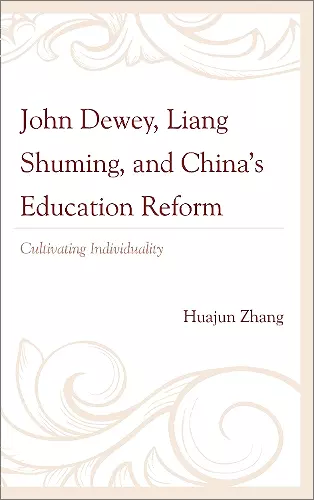John Dewey, Liang Shuming, and China's Education Reform
Cultivating Individuality
Format:Hardback
Publisher:Lexington Books
Published:19th Apr '13
Currently unavailable, and unfortunately no date known when it will be back

This book explores the central question of how to cultivate a continued sense of self in the radically changing Chinese society, a question that is highly related to the current ongoing educational reform. If education cannot respond to the problem of students’ disconnection from the changing society, learning cannot truly happen in school and the reform will fail. Zhang suggests a philosophy of education that highlights the cultivation of students’ unique but inclusive individuality so that students learn how to nurture their own mind in this profoundly changing society rather than becoming empty and lost. The discussion of this proposed question is inspired by the thoughts of the American pragmatist John Dewey and Chinese Confucian scholar Liang Shuming. It is not the author’s intention to have a pure philosophical discussion, but rather to refer to their philosophies to help answer the practical question of cultivating individuality in an educational setting during this period of China’s modern transition.
This book combines a succinct philosophical stance with practical implications to address China’s modern transition and education reform. The author is driven by a quest for inclusive individuality amidst far-reaching social changes. Readers are invited to engage in the dialogue with Dewey, Liang and the author to consider the tensions between Confucian tradition and westernization, and between individualism and community living. As I read the book I was captivated by the author’s passionate quest, beginning with the discovery of an absence of the self in her own schooling despite her having met all the demands for high achievement. Despite the speed of social, economic, and cultural changes being widely felt, this book has made a valuable contribution to understanding ongoing continuities. . . .[T]he author presents a salient thesis to highlight the critical difference between a self conducted process of being transformed and a self-transformation process. . . .While the book has opened up many avenues for meaningful intellectual and practical journeying, the conclusion has come back to the vision for China’s education reform with a clear critique of the dominant social culture of exclusive success, which undoubtedly carries global significance for the moral development of all educators in our global village. * Frontiers of Education in China *
In 1899 John Dewey declared, 'It is radical conditions which have changed, and only an equally radical change in education suffices.' In this insightful, poignant, and important new book Huajun Zhang responds to Dewey’s call in the context of her own radically changing Chinese society, eschewing both the mindless conformity to tradition or the uncritical embrace of the new so common in contemporary educational discourse in favor of a synthesis that might rescue and sustain the continuity of the self in the midst of rapid and profound social change. This is comparative philosophy of education at its finest. -- Jeff Milligan, Florida State University
This vivid narrative draws on core ideas from John Dewey and Liang Shuming, China’s last Confucian, to develop the concept of an inclusive individuality that can root the self at a time of rapid social change across our globe. Zhang provides a bridge between the educational worlds of China and North America, highlighting profound lessons that can be learned from each side in a dialogue across civilizations. It is an essential read for all those who wish to understand an emerging China. -- Ruth Hayhoe Ph.D, Professor, Ontario Institute for Studies in Education, University of Toronto
This is a unique and timely book about Chinese education, and about education overall. In the drive for competitive edge and “success” in the material world, the true purpose of education, and the true purpose of our living a life, is lost. Education should help us realize who we are, in terms of our authentic unique self, and also in terms of our larger inclusive social self. This process involves intelligence, inner struggles, self-enlightenment, and new pedagogical strategies. This book helps us to ponder educational reforms in China, but also other challenges in education throughout the world. The dialogue between John Dewey and Liang Shuming shows that cultivating our individuality involves many layers: the inner and outer, self and selfless, and self-transformation and social transformation are intricately intertwined. -- Jin Ling, University of Maryland
ISBN: 9780739147924
Dimensions: 234mm x 161mm x 23mm
Weight: 408g
192 pages